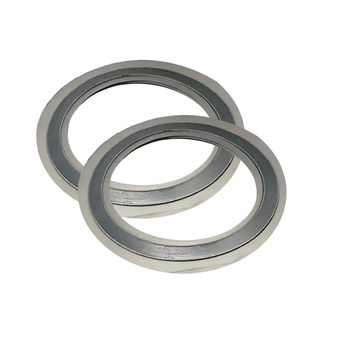In high-temperature, high-pressure piping systems, conventional gaskets often fail catastrophically. Metal spiral wound gaskets, with their composite structure of elastic metal and flexible filler, create a unique “rigid-yet-flexible” sealing solution. This article reveals why they are the ultimate choice for extreme conditions in petrochemical and nuclear industries.
I. Structural Anatomy: Precision Layered Engineering
EN 1092-1 Standard Construction:
|-----------------------------------------------|
| Metal Ribbon (CS/SS/Ti) → Pressure Resistance |
| Filler Layer (Graphite/PTFE/Mica) → Micro-Sealing |
| V-Shaped Corrugated Windings (25-45 layers) → Elastic Reservoir |
| Inner/Outer Rings (304SS/316L) → Blowout Protection |
|-----------------------------------------------| Sealing Principle: Pressure increase → Radial contraction of V-rings → Filler expansion seals micro-gaps
II. Performance Dominance (vs. Flat Gaskets)
| Parameter | Asbestos Gasket | Spiral Wound Gasket | Improvement |
|---|---|---|---|
| Max Temperature | 260°C | 800°C | 3.1× |
| Pressure Limit | 10 MPa | 42 MPa | 4.2× |
| Thermal Cycles | 50 | 5,000 | 100× |
| Leak Rate (He mass spec) | 1×10⁻² mbar·L/s | 1×10⁻⁶ mbar·L/s | 10,000× |
Critical Applications:
- Thermal expansion compensation (ΔL=12mm/m @550°C steam lines)
- Cryogenic shock resistance (-196°C→25°C)
- Hydrogen permeation barrier (<0.001ppm @15MPa hydrogen reactors)
III. Industry Problem-Solving Cases
**▶ Cracker Quench System Failure**
- Problem: Graphite gasket fracture under 950°C quench oil
- Solution: Inconel 625 + flexible graphite winding
- Result: Maintenance interval ↑ from 3 months → 2 years (saves $12M/year)
**▶ LNG BOG Compressor Leakage**
- Problem: Seal failure at -162°C
- Solution: Titanium winding + modified PTFE filler
- Result: Methane emissions ↓ from 2,300m³/h to 5m³/h
IV. Selection Matrix
| Condition | Metal Ribbon | Filler Material | Sealing Stress |
|---|---|---|---|
| Strong acids (pH<1) | Hastelloy C276 | ePTFE | 90-120 MPa |
| Nuclear steam lines | 316L Nuclear | Nuclear graphite | 150-200 MPa |
| Supercritical CO₂ | Incoloy 825 | Gold-plated mica | 180-240 MPa |
| Aerospace fuel systems | Monel 400 | Fluorographite | 210-280 MPa |
Golden Rules:
- T>540°C → Avoid PTFE fillers
- Pressure pulsation>10Hz → Must have inner/outer rings
- Solid particles in media → Filler hardness>90 Shore A
V. Installation Revolution
Flawed Traditional Method:
Hammer tightening → Uneven stress → 37% localized crushing Laser-Guided Assembly (Patented):
- 3D scan flange flatness (±3μm)
- Optimize bolt sequence (FEA simulation)
- Hydraulic tensioning (<5% deviation)
→ Achieves >94% uniform sealing stress
Post time: Jul-02-2025

